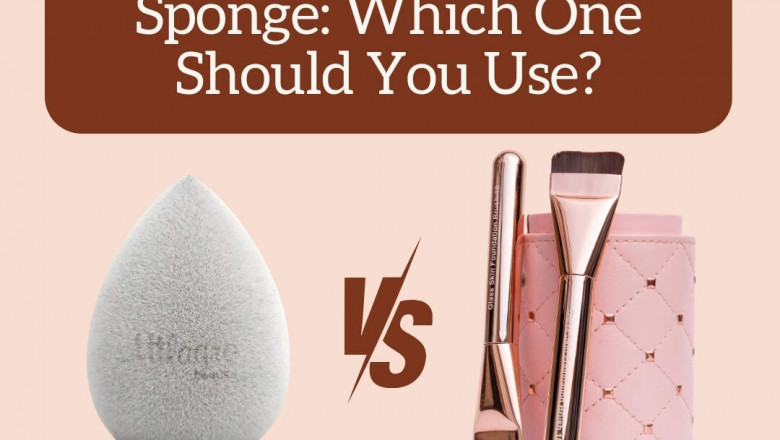views
Foundation Brush vs. Sponge: Which One Should You Use?
When it comes to getting a flawless makeup base, one of the most common questions is whether to use a foundation brush or a makeup sponge. Both makeup enthusiasts and professionals love the tools, but they each have their distinct advantages and disadvantages. To help you decide which tool is best for your needs, we've explained their pros and cons, application techniques, and suitability for different skin types and foundation formulas.
The Foundation Brush
Foundation brushes come in different shapes and sizes, from flat brushes to stippling and angled brushes. Each type serves a specific purpose, but all are designed to help you apply your foundation with precision and control.
Pros of Using a Foundation Brush
-
Precise Application: Brushes allow for precise application, making it easier to target specific areas like under the eyes or around the nose.
-
Buildable Coverage: With a brush, you can easily control the amount of foundation you apply, allowing for buildable coverage without looking cakey.
-
Hygienic: Brushes are easier to clean than sponges, reducing the risk of bacteria buildup when properly maintained.
-
Versatility: Many brushes can handle both liquid and powder foundations, making them a versatile item in your makeup kit.
-
Less Product Waste: Unlike sponges, brushes don’t absorb as much product, ensuring you get the most out of your foundation.
Cons of Using a Foundation Brush
- Streaks: Improper technique or a low-quality brush can cause streaks, which require extra effort to blend.
- Learning Curve: Mastering the right technique for a streak-free finish may require some practice.
- Time-consuming: Depending on the type of brush, it may take longer to achieve a seamless look compared to a sponge.
The Makeup Sponge
Makeup sponges, particularly the Beauty Blender, have risen in popularity due to their ease of use and ability to create a natural, dewy finish. Sponges are typically used damp for optimal results.
Pros of Using a Makeup Sponge
-
Flawless Finish: Sponges are known for creating a seamless, airbrushed finish that is hard to achieve with a brush.
-
Easy to Use: Even beginners can get great results with sponges, as their soft texture helps them blend their foundation easily.
-
Great for Blending: Sponges are great for blending, especially when working with cream or liquid products.
-
Multifunctional: Besides foundation, sponges can also be used to apply concealer, cream blush, or setting powder.
-
Works Well with Hydrating Foundations: For dewy or glowy foundations, sponges enhance natural glow by spreading the product evenly.
Cons of Using a Makeup Sponge
-
Product Absorption: Sponges absorb a significant amount of foundation, leading to more product waste.
-
Maintenance: Sponges need to be washed frequently to prevent bacteria buildup, which can be tedious.
-
Durability: Sponges have a shorter lifespan than brushes and need to be replaced more often.
-
Not Ideal for Full Coverage: If you prefer a full coverage look, sponges may require more effort and product to achieve the desired results.
How to Choose Between a Brush and a Sponge
1. Skin Type
-
Dry Skin: A damp sponge is ideal for dry skin as it helps retain moisture and creates a dewy finish.
-
Oily Skin: A foundation brush can provide better control and matte coverage for oily skin types.
-
Sensitive Skin: Sponges are gentler on sensitive skin, reducing the risk of irritation.
2. Desired Finish
-
If you prefer a natural, glowing finish, a sponge is your go-to tool.
-
For a polished and full-coverage look, a foundation brush is more suitable.
3. Foundation Formula
-
Liquid Foundation: Both brushes and sponges work well, but sponges excel at blending liquid formulas for a seamless finish.
-
Powder Foundation: Brushes are better suited for powder products as sponges may not pick up and distribute the product evenly.
-
Cream Foundation: Brushes provide more control, while sponges ensure even blending.
4. Time and Effort
-
If you’re short on time, a sponge can quickly blend foundation without much effort.
-
For more detailed work, a brush may take longer but offers precision.
Application Tips for Each Tool
Using a Foundation Brush
-
Start by applying a small amount of foundation to the back of your hand or onto a palette.
-
Lightly dip the brush into the product.
-
Apply in small, circular motions or gentle strokes, starting from the center of the face and blending outward.
-
Use a stippling motion to build coverage without streaks.
Using a Makeup Sponge
-
Wet the sponge and squeeze out excess water until it's damp but not dripping.
-
Dab the sponge into the foundation.
-
Gently move the sponge across your face, starting from the center and working outward.
-
Use the pointed end for hard-to-reach areas like the corners of the eyes and nose.
Can You Use Both?
Absolutely! Many makeup artists use a combination of both tools for optimal results. For instance:
-
Use a brush to apply foundation evenly and a sponge to blend out the edges for a flawless finish.
-
A brush can be used to build coverage, while a sponge ensures seamless blending.
Final Thoughts
Choosing between a foundation brush and a sponge ultimately depends on your personal preference, skin type, and the kind of finish you want. Both tools have their pros and cons, and there's no one-size-fits-all solution.
Experiment with both to see which works best for your makeup routine — or incorporate both into your toolkit to get the best of both worlds. Whether you're on the brush or sponge team, the key to applying foundation flawlessly lies in technique. With the right tools and methods, you can achieve a great makeup look every time.






















Comments
0 comment